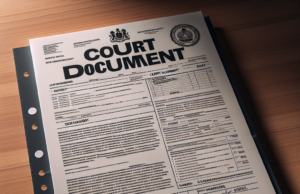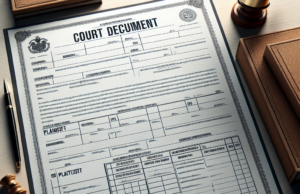
Divorce is never an easy process, but when both parties cannot come to an agreement on key issues such as property division, child custody, and alimony, it becomes a contested divorce. In Massachusetts, a contested divorce is a complex legal battle that can take months or even years to resolve. Here are some key points to consider if you are facing a contested divorce in Massachusetts.
Grounds for Divorce
In Massachusetts, you can file for divorce on either fault or no-fault grounds. Fault grounds include adultery, desertion, cruel and abusive treatment, and drug or alcohol abuse. No-fault grounds are based on the irretrievable breakdown of the marriage and require a separation period of at least 18 months in most cases. If you file for divorce based on fault grounds, you will have to prove your allegations in court, which can make the contested divorce even more challenging.
Contested Divorce Process
If you and your spouse cannot reach an agreement on all the issues related to your divorce, you will need to go to court and have a judge decide these issues for you. This process can take several months or even years, depending on the complexity of the case and the court’s schedule. Both parties will have to present evidence and arguments to the court and attend several hearings and meetings before the trial takes place. It is important to have a skilled and experienced attorney representing you during this process.
Property Division
In Massachusetts, property division is based on equitable distribution, which means that each spouse is entitled to a fair and just share of the marital property. Marital property includes all assets and debts acquired during the marriage, including real estate, bank accounts, retirement accounts, and investments. The court will consider factors such as the length of the marriage, each spouse’s earning capacity, and contributions to the marriage when making a decision on property division.
Child Custody and Support
When it comes to child custody, the court’s main priority is the best interests of the child. The court will consider factors such as each parent’s ability to provide for the child’s physical and emotional needs, the child’s relationship with each parent, and any history of abuse or neglect. Child support is determined based on the Massachusetts Child Support Guidelines, which take into account the parents’ income, the number of children, and other factors such as medical expenses and child care costs.
Alimony
Alimony, also known as spousal support, is awarded to one spouse based on several factors, including the length of the marriage, each spouse’s income and earning potential, and contributions to the marriage. The court can award different types of alimony, including rehabilitative, transitional, and general term alimony, depending on the circumstances of the case.
In conclusion, if you are facing a contested divorce in Massachusetts, it is crucial to have a knowledgeable and dedicated attorney by your side. The process can be lengthy, stressful, and emotionally draining, but with the right legal representation, you can protect your rights and achieve a fair resolution.
What is a Contested Divorce?
A contested divorce is a more complex form of divorce.
In the United States, there are typically two forms of divorce: an uncontested divorce and a contested divorce. With an uncontested divorce, the spouses agree on all issues pertaining to the divorce filing; whereas in an uncontested divorce, the spouses cannot come to an agreement on one or many of the issues surrounding the perspective divorce settlement.
The issues that may lead to a contested divorce filing may include spousal support, child custody, and the division of debts and/or marital property. Because of the disagreement, the divorce proceeding is complicated and extended in a contested divorce filing.
In a contested divorce, the spouses will go through a number of legal steps before the divorce is affirmed. Following the delivery of the divorce petition—and the subsequent response by the receiving spouse—the discovery phase and prospective settlement occur.
During the settlement, the spouses are often unable to resolve their issues. Although lawyers and the presiding divorce judge may encourage the spouses to come to an agreement, a contested divorce often ends up in divorce court.
During the trial, each spouse will present their case. This legal battle will often include witness testimonials, cross-examinations—conducted by each spouse’s divorce lawyer—and closing arguments.
After the trial is over, the presiding divorce court judge will construct a final order and finalize the divorce to the terms as he/she sees fit.
In a contested divorce, the settlement is established by the presiding divorce court judge.
After a review of the spouse’s financial records, testimonies offered by spouses, witness testimonials, and any available police or medical records, the judge will determine how the couple’s debts, assets, and future wages are divided.
The evidence presented in a contested divorce filing establishes a fair division of debts and assets and the best interests of the child of the marriage.
Contested Divorce in Massachusetts:
The Main Steps to a Contested Divorce in Massachusetts are as follows:
1. A contested divorce in Massachusetts begins when one spouse files a “Complaint about Divorce” with their local Probate and Family Court. The spouse filing the complaint in a contested divorce in Massachusetts is referred to as the Plaintiff.
The complaint—along with a summons and track assignment (notice which specifies what judge is assigned to the case)—is delivered or “served” to the other spouse, who is the acting defendant in a contested divorce in Massachusetts.
In addition to this paperwork, a copy of Rule 411 is delivered to the defendant; this form is a financial restraining order that automatically goes into effect.
2. The defendant or their acting lawyer will answer the complaint within 20 days and forward a copy of the answer to the appropriate court and the opposing divorce lawyer.
3. After the defendant responds, the contested divorce in Massachusetts enters a pre-trial phase. This stage of the contested divorce in Massachusetts is referred to as the discovery period.
During discovery, each side will collect the pertinent information required to prepare a divorce filing.
Discovery methods in a contested divorce in Massachusetts include: Exchanging financial documents, medical/police reports, depositions, requests for admissions, and interrogatories.
4. Temporary Orders and Motions: Divorce lawyers often file motions with the presiding divorce court. A motion is a request—filed with the court—that formally begins the divorce hearing.
There are several types of motions; however, in a contested divorce in Massachusetts, a temporary order will typically be filed.
5. If child custody issues are being disputed, the Court will appoint a GAL or Ad Litem to conduct an investigation regarding visitation and custody. The appointed GAL or Ad Litem will interview parents, teachers, caregivers, and sometimes the children.
6. Pre-Trial Conference: If a contested divorce in Massachusetts remains unsettled, a pre-trial will be held at the presiding divorce court.
Here, the divorce lawyers will submit Pre-trial Memorandums before the meeting to outline what issues are in dispute, and which have been tentatively agreed to if any.
This conference also gives each side the opportunity to get some feedback on their positions.
7. The Trial: In Massachusetts, less than 10% of divorce cases reach this stage. For that contested divorce in Massachusetts that cannot be settled, a trial will commence before a judge.
Testimonies will be provided by the couple’s witnesses and the Judge will issue a decision—the decision is rendered a number of days after the trial date.
After the judge issues the decision, there is a waiting period of 90 days for a contested divorce in Massachusetts. During this waiting period, the divorce is regarded as “pending”—after the 90-day period passes, the divorce is finalized.

















